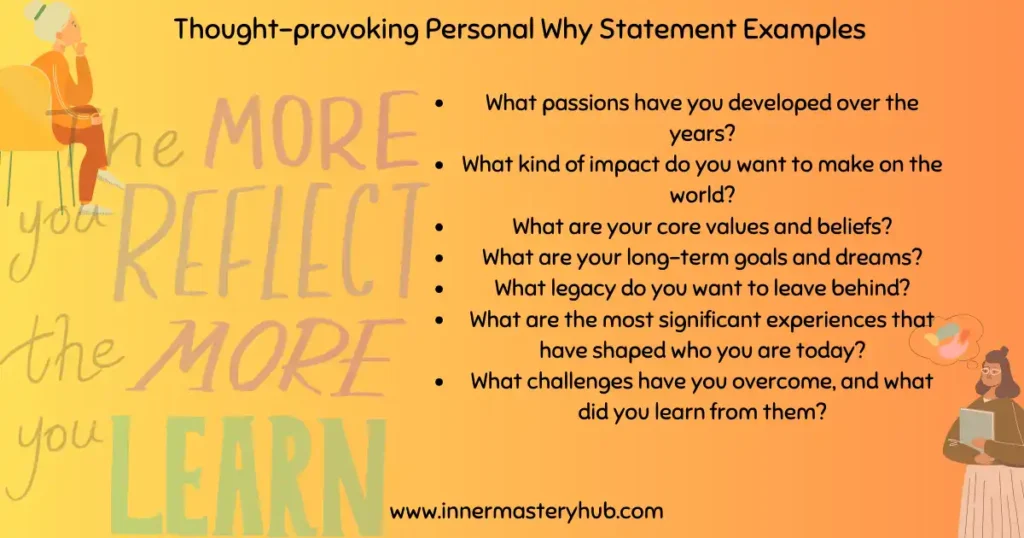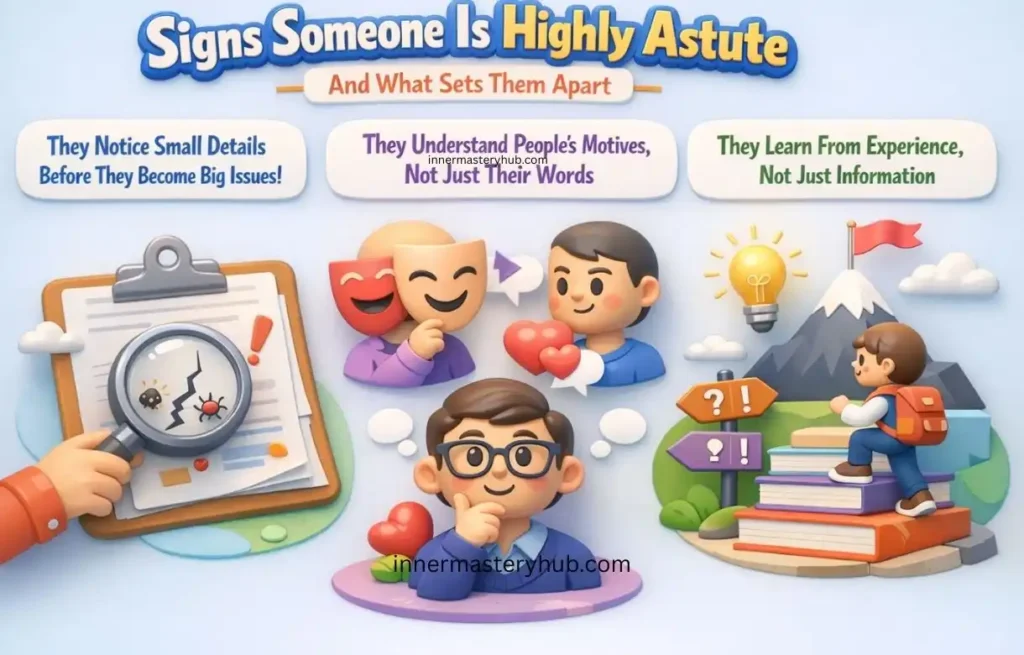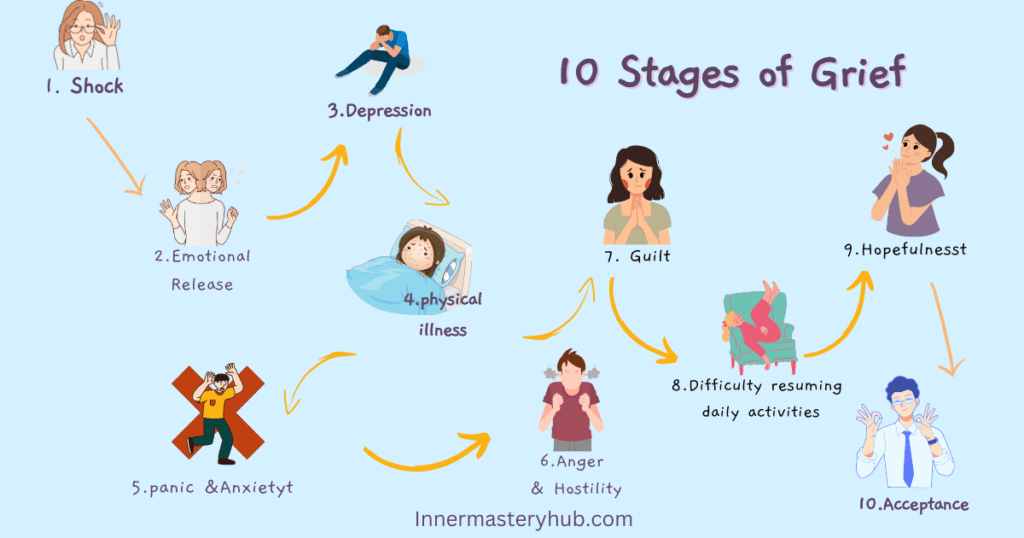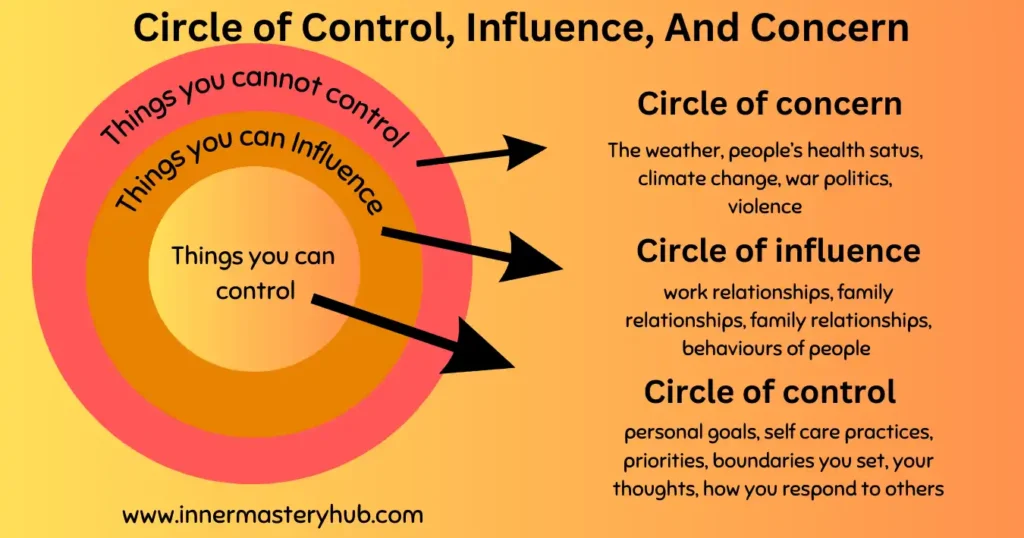25 Personal Why Statements That Don’t Sound Cringe
Personal Why Statements
Personal Why Statements are short, intentional declarations that define your deeper purpose and values. In mental health, they serve as grounding tools that support motivation, emotional regulation, and long-term well-being by reminding you why you keep going, even during difficult moments.

Have you ever pondered your motivation for waking up? Or what motivates you to act in certain ways? You may have pondered, “I want to be happy,” or “I want to make a difference.” Those ideas and emotions are a component of your “why.” It helps you find meaning in your life.
When things are difficult, your why Statement explains why you get out of bed. It’s your motivation when times are tough. In addition to inspiring others, it’s what gives you a sense of excitement and zest for life.
What is a personal mission statement?
A personal why Statement is a kind of life roadmap. Often, this brief and straightforward Statement explains your goals and motivations. It’s about your goals and the type of person you want to become. It’s your manual for deciding what to do and how to do it.
Consider it your life’s work, condensed into a single sentence. It can be your career statement, your professional and personal development statement, or a personal statement sent with your university application.

The personal why statement examples
A personal “why” statement reflects a person’s underlying motivations and values. To help one’s behaviours and decisions align with objectives, it’s a personal mission statement. Examples of “why” statements for a variety of personal motives and objectives are as follows:
Personal Development
I am dedicated to self-improvement and lifelong learning because I believe the best way to forecast the future is to create it. To assist people and contribute significantly to society, I aim to continually improve my intellectual, emotional, and spiritual development.
Progress in Your Career
Improving people’s lives during their most vulnerable moments is what drives me to work in healthcare. Along with providing exceptional comfort and care, I aim to ensure that every patient feels heard and appreciated during their session.
Personal why statements for work?
Here are simple personal “why” statements for work you can adapt:
My why is to do meaningful work that helps others succeed.
My why is to solve problems and make things easier for people.
My why is to grow my skills while contributing real value.
My why is to support my team and deliver quality results.
My why is to make a positive impact through consistent, honest work.
My why is to turn effort into progress, for myself and others.
Creative Expression
I am motivated to investigate and convey human emotions as well as the beauty of the environment around us through my art. I create to build deeper connections with people and to spread beauty and understanding throughout the world.
Environmental Action
My commitment to promoting sustainable living stems from my belief that protecting our planet is essential for future generations. Through my efforts and advocacy, I hope to educate and inspire others about the importance of environmental stewardship.
I try to be my family’s rock and a wellspring of unwavering affection. It is my goal to provide children with a secure, caring, and encouraging environment so they can pursue their goals, knowing they are loved and supported.
Benefits of creating a personal why statement
Personal “why” statements help you discover your life objectives.
Knowing your “why” gives you direction.
Your “why” can help you stay true to your values in challenging situations.
When you know your “why,” you’re more likely to follow your values.
What should a personal why statement include?
A strong personal why Statement should help you identify core motivations, values, and aspirations. It should communicate:
- Your core values. What principles guide your life?
- Your passions. What truly excites and energises you?
- Your goals. What do you want to achieve in life?
- Your impact. How do you want to contribute to the world?
- Your purpose. What is the overarching meaning you seek in life?
Your why Statement should be personal and authentic. It’s a reflection of your unique journey and what drives you.
Questions to ask yourself before drafting your personal why Statement
- What are the most significant experiences that have shaped who you are today?
- What challenges have you overcome, and what did you learn from them?
- What passions have you developed over the years?
- What kind of impact do you want to make on the world?
- What are your core values and beliefs?
- What are your long-term goals and dreams?
- What legacy do you want to leave behind?
Reflect on these questions; you’ll gain a clear and concise understanding of your motivations and be better equipped to craft a powerful personal why statement.
What is an example of a person’s why?
My why is to help people feel confident and capable. I believe small guidance can change lives. I wake up motivated to support others, solve problems, and leave every person a little better than before, every single day, with purpose.
How do you write a personal why statement?
You now have all the resources you need to determine your life’s purpose.
Think about your interests.
After that, consider your desired outcomes. What are your major aspirations? Is becoming a doctor, starting a business, or travelling the world your goal? Or for the benefit of humanity?
Imagine your desire to make a positive impact on the world or help others. Which would you prefer: inspiring others, preserving the environment, or helping animals? In this way, you can have an effect.
Consider that you have a clean screen or a blank page. Begin writing anything that enters your head. You don’t need to seem intelligent or make sense. Just let your mind wander.
One of the things you can ask yourself is, “Why am I here?” or even “What makes me happy?” Try drawing pictures, writing sentences, or creating lists. The aim is to spread all your thoughts.
Choose words that inspire feelings while remaining succinct.
Create a vision board by combining phrases and images that best express your motivation. Writing self-affirmations or positive remarks might help you stay motivated.
Next, consider how you can integrate your ‘why’ into your actions. Make goals that align with your mission. For instance, volunteering at a shelter could be your answer if helping animals is your motivation.
Don’t forget to appreciate your small victories! Little steps add up. After achieving a goal, reward yourself. It sustains your enthusiasm and drive for your journey.
FAQs about Personal Why Statements
What is a personal “Why” statement?
A personal Why Statement is a short sentence that explains your core purpose—why you do what you do. It links your values, goals, and actions, giving your life direction and meaning.
How do I write my personal Why Statement?
Reflect on your values, strengths, passions, and how you want to impact others. Then craft a simple sentence: “I do X so that Y.” Use that as your Why.
Can my personal why Statement change over time?
Yes. As you grow, your experiences and priorities evolve. It’s fine to revisit and refine your Why to stay true to who you are now.
How do I answer what is my why?
Here’s a simple way to answer “What is my why?”
Think about what matters most to you.
Ask: Who do I want to help?
Ask: What change do I want to make?
Put it into one clear sentence.
What’s the difference between a why Statement and a mission statement?
A Why Statement focuses on your deeper purpose, your “why.” A mission statement typically outlines what you plan to do, your approach, and your objectives.
Personal why statements for students?
My why is to learn so I can create a better future for myself.
My why is to gain knowledge so I can help my family and community.
My why is to grow every day and become the best version of myself.
My why is to succeed in school so I can reach my dreams.
My why is to learn new skills and make a positive impact.
My why is to prove to myself that I can overcome challenges.
Why statement examples for work?
A why statement for work explains your purpose and motivation. For example, my why is to create meaningful impact with my skills, contribute value to others, and grow continuously while doing work aligned with integrity, learning, and positive change.






